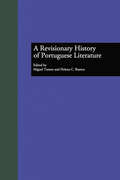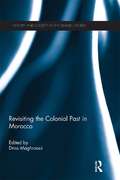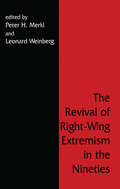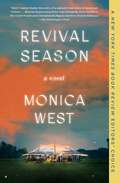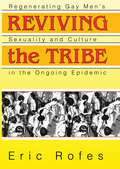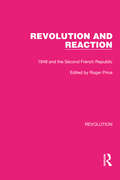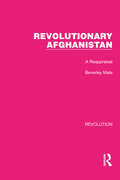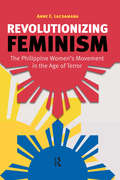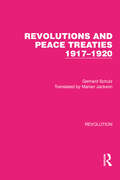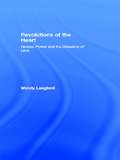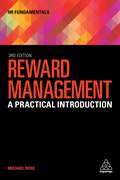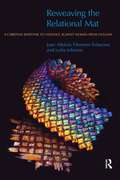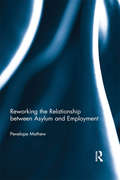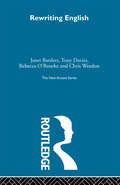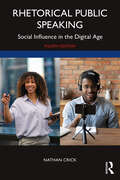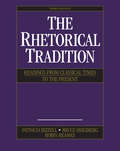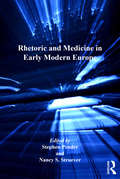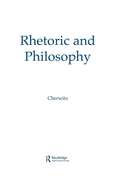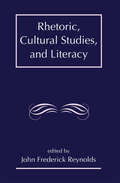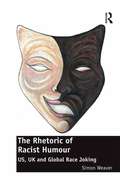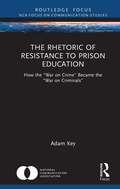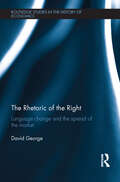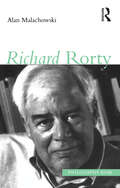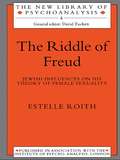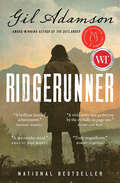Special Collections
Benetech’s Global Certified Accessible Titles
Description: Benetech’s GCA program is the first independent third-party EPUB certification to verify ebook accessibility. By creating content that is born accessible, publishers can meet the needs of all readers. Learn more: https://bornaccessible.benetech.org/
- Table View
- List View
A Revisionary History of Portuguese Literature
by Miguel Tamen and Helena C. BuescuFirst published in 1999. Routledge is an imprint of Taylor & Francis, an informa company.
Revisiting the Colonial Past in Morocco
by Driss MaghraouiExploring the concept of ‘colonial cultures,’ this book analyses how these cultures both transformed, and were transformed by, their various societies. Challenging both the colonial vulgate, and the nationalist paradigm, Revisiting the Colonial Past in Morocco, examines the lesser known specificities of particular moments, practices and institutions in Morocco, with the aim of uncovering a ‘new colonial history.’ By examining society on a micro-level, this book raises the profiles of the mass of Moroccans who were highly influential in the colonial period yet have been excluded from the historical record because of a lack of textual source material. Introducing social and cultural history, gender studies and literary criticism to the more traditional economic, political and military studies, the book promotes a more complex and nuanced understanding of Moroccan colonial history. Employing new theoretical and methodological approaches, this volume encourages a re-assessment of existing work and promotes a more interdisciplinary approach to the colonial history of Morocco. Revisiting the Colonial Past in Morocco is a highly topical and useful addition to literature on the subject and will be of interest to students and scholars of History, Imperialism and more generally, Middle Eastern Studies.
The Revival of Right Wing Extremism in the Nineties
by Peter H. Merkl and Leonard WeinbergMost studies of the radical right concentrate on movements in a single country, neglecting to some extent the international dimensions of right-wing extremism. Here, Merkl and Weinberg adopt a comparative perspective, concentrating on the revival of the right across a variety of countries.
Revival Season
by Monica WestThe daughter of one of the South’s most famous Baptist preachers discovers a shocking secret about her father that puts her at odds with both her faith and her family in this “tender and wise” (Ann Patchett, author of Commonwealth) debut novel.
Every summer, fifteen-year-old Miriam Horton and her family pack themselves tight in their old minivan and travel through small southern towns for revival season: the time when Miriam’s father—one of the South’s most famous preachers—holds massive healing services for people desperate to be cured of ailments and disease. This summer, the revival season doesn’t go as planned, and after one service in which Reverend Horton’s healing powers are tested like never before, Miriam witnesses a shocking act of violence that shakes her belief in her father—and in her faith. When the Hortons return home, Miriam’s confusion only grows as she discovers she might have the power to heal—even though her father and the church have always made it clear that such power is denied to women.
Over the course of the next year, Miriam must decide between her faith, her family, and her newfound power that might be able to save others, but, if discovered by her father, could destroy Miriam.
Celebrating both feminism and faith, Revival Season is a story of spiritual awakening and disillusionment in a Southern, black, Evangelical community. Monica West's transporting coming-of-age novel explores complicated family and what it means to live among the community of the faithful.
Reviving the Tribe
by Eric RofesReviving the Tribe creates a rich and brutally honest portrait of contemporary gay men’s lives amidst the seemingly endless AIDS epidemic and offers both autobiographical self-examination and a relentless critique of current sexual politics within the gay community. Fearlessly confronting the horrors experiences by surviving gay men without giving way to hopelessness, denial, or blame, Reviving the Tribe offers an inspiring blueprint for the gay community which faces a continuing spiral of disaster.In Reviving the Tribe, Author Eric Rofes argues that a return to the interrupted agenda of gay liberation may provide long-term motivation to keep gay men alive and spur rejuvenation of new generations of gay culture. By interweaving social history, psychology, anthropology, epidemiology, sociology, feminist theory, and sexology with his own journey through the epidemic, Rofes provides a moving and compelling argument for stepping out of the “state of emergency” and embracing a life beyond disease. He boldly offers a plan for community regeneration focused on restoring mental health, reclaiming sexuality, and mending the social fabric of communal gay life. Rofes asks unspoken questions lurking in gay men&’s minds and suggests answers to these questions, hitting such controversial topics as: gay men&’s sex cultures of the 1970s why “educated” gay men continue to become HIV-infected changing forms of gay masculinity the opening of new sex clubs and bathhouses leaving “rage activism” behind links between the Holocaust and AIDS unacknowledged roots in the feminist movement of gay men’s AIDS response mass denial of chronic trauma among gay menThe refusal to confront the ever-intensifying manifestations of AIDS has seriously endangered the foundation of contemporary gay communities. Rofes argues that many gay men suffer from the ”disaster syndrome,” a psychologically determined response that defends individuals against being overwhelmed by traumatic experience. In Reviving the Tribe, he provides a radical critique of contemporary gay political culture and suggests alternatives which offer the opportunity to face history, grapple with decimation, and regenerate communal life.Cautioning that an honest analysis of recent gay history and urban cultures promises neither to stop gay men’s suffering nor to end continuing HIV infections, Reviving the Tribe provides gay men with a clear lens through which they might scrutinize their lives, come to a new understanding of the epidemic’s impact on their generation, and redirect activism. This courageous and inspiring work brings Rofes’commanding intellect and twenty years of grassroots gay activism to bear on the challenging task of reconstructing gay life in the new mellennium. Reviving the Tribe is filled with insight of special interest to gay men, lesbians involved in the mixed lesbian/gay movement, sociologists, public health workers, psychologists, counselors, sex educators, religious leaders, and AIDS prevention policymakers searching for fresh vision.
Revolution and Reaction
by Roger PriceThis book, first published in 1975, examines the events of the French Second Republic, the themes of protest and repression in particular. It analyses how popular discontent is mobilised and becomes political protest and revolution, and how the machinery of government operates in a crisis situation.
Revolutionary Afghanistan
by Beverley MaleThis book, first published in 1982, examines the reality of the so-called revolution in Afghanistan. It focuses on the career of Hafizullah Amin, considered in the West as a near-genocidal mass murderer, intent on establishing a personal fiefdom in Afghanistan. However, this book argues that he was a man struggling against impossible odds to preserve his country’s independence and at the same time drag it into the twentieth century. He commanded such loyalty and support within the Afghanistan Communist Party and the armed forces that the Russians had to invade to get rid of him.
Revolutionizing Feminism
by Anne E. LacsamanaRevolutionizing Feminism offers the first feminist analysis of the human rights crisis in the Philippines during the Arroyo presidency (2001-2010) and the declaration of the country as the 'second front' in the US-led 'war on terror'. During this period over 1,000 activists, including peasants, journalists and lawyers, were murdered. Lacsamana situates Filipino women within the international division of labour, showing the connection between the 'super-exploitation' of their labour power at home and their migration abroad as domestic workers, nurses, nannies, entertainers, and 'mail-order brides'. In contrast to the cultural turn in feminist theorising that has retreated from the concepts of class and class exploitation, Revolutionizing Feminism seeks to reorient feminist scholarship in order to better understand the material realties of those living in an increasingly unstable and impoverished global south.
Revolutions and Peace Treaties 1917–1920
by Gerhard SchulzThis book, first published in 1972, is an analysis of popular movements, political convulsions and settlements that led to and resulted from the climax of the First World War and its aftermath. It considers the aims, achievements and failures of both the Allied and Central Powers, the major internal changes which took place during and just after the war, and the significance of the newly shaped Europe and Near East which emerged from the peace treaties.
Revolutions of the Heart
by Wendy LangfordThis book looks at how heterosexual relationships really work. Author?? argues that the process of falling in love is just a brief holiday from the gender roles which quickly reassert themselves in their old forms. Topics covered include romantic love, the problem of desire and the trouble with love.
Reward Management
by Michael RoseHow can I fairly reward and recognize employees and align this with team and organizational performance? Reward Management is a practical guide for understanding how to develop successful reward strategies.It covers key areas including pay and grade structures, job evaluation, non-cash reward, pay reviews, bonus plans and tax issues. Featuring guidance, practical tools and case studies throughout, this book provides the knowledge and skills needed to plan, implement and assess an effective reward strategy in any type of organization.This third edition of Reward Management includes the latest research and developments, such as how to incorporate wellbeing and new technologies in reward strategy and how new ways of working may affect a benefits package. Case studies include insight from McDonald's UK, Marks and Spencer and Which? to show how this can be applied in practice. Online resources include downloadable templates and further tools to be used in practice.HR Fundamentals is a series of succinct, practical guides featuring exercises, examples and case studies. They are ideal for students and those in the early stages of their HR careers.
Reweaving the Relational Mat
by Joan Filemoni-Tofaeono and Lydia JohnsonReweaving the Relational Mat is an integrative response to the problem of violence against women which grounds theological and sociological analysis in the praxis of Oceanian Christian women's experiences of violence. It focuses on the collusion of the church in the problem of violence against women by critiquing the ways in which its theology and practices have contributed to 'power-over' ways of relating. Employing the Oceanian metaphor of weaving the mat, the analysis 'unravels' the 'patriarchal relational mat,' paving the way for a constructive 'reweaving' of a Christocentric 'egalitarian relational mat.' The study begins by unravelling the correlation between violence and the ideology of patriarchy. It then highlights the various strands of violence against women, and examines the complex mosaic of socio-cultural sources and manifestations of violence against women in Oceania. This leads to an analysis of the interwoven strands of religion and violence, focusing particularly on the church's captivity to patriarchy. The ensuing explication of problematic theological and biblical interpretations and church practices ends with a critique of male clergy power, particularly as it functions in the Oceanian context. This leads to an examination of the relationship between flawed theological education and violence against women. Case studies of violence against women in the Oceanian theological education setting are analysed. The subsequent 'reweaving of the relational mat' issues forth in specific challenges to church leaders, theological educators and church women.
Reworking the Relationship between Asylum and Employment
by Penelope MathewTouching on the laws and practices of a wide array of countries around the globe, this book examines the extent to which refugees and asylum-seekers’ right to work is protected by international human rights law. The book examines a number of key international treaties, national constitutions and some foundational cases from national courts in order to make the case that the practise of restricting refugees and asylum-seekers access to the labour market is illegal. In so doing, the author examines some intricate legal questions, such as the interpretation of the Refugee Convention’s provisions restricting rights to refugees ‘lawfully staying’, the application of racial discrimination to citizenship distinctions, and the ways in which limitations on human rights are applicable in this context. The book also looks at some broader philosophical questions such as the meaning of equality and human dignity, and the legitimacy of the right to work. The book goes on to explore broader debates concerning migration and ‘open borders’ in order to unpack the fears that drive many countries’ restrictive measures. Readers are invited to consider whether the world would be a better place with more freedom of movement. It is a unique stand-alone treatment of the subject and includes the Michigan Guidelines on the Right to Work. Reworking the Relationship between Asylum-Seekers and Employment is written in an accessible style that will appeal to academics, policy-makers, practitioners and students. It combines a strong black-letter approach with a law in context approach that explains why the law takes its current shape and questions current orthodoxy.
Rewriting English
by Janet Batsleer and Tony Davies and Chris Weedon and Rebecca O'RourkeFirst Published in 2002. Routledge is an imprint of Taylor & Francis, an informa company.
Rhetorical Public Speaking
by Nathan CrickThis textbook offers an innovative approach to public speaking by employing the rhetorical canon as a means of constructing artful speech in a multi-mediated environment. By stressing how contemporary public speaking continues the classical art of persuasion, this book provides a foundation to guide students in constructing and delivering messages that address matters of concern and interest to their audience. This edition features contemporary as well as historical examples to highlight key concepts and show how rhetoric works in practice. It not only emphasizes the traditional skills of face-to-face oratory, but it also includes a chapter solely dedicated to highlighting the techniques and tactics of digital social influencing that adapts public speaking to online platforms. Each chapter includes speech excerpts, summaries, and exercises for review and retention. This textbook for courses in public speaking and rhetoric will particularly appeal to instructors wishing to foreground speaking as engaged citizens on public and political issues. Online resources include an instructor’s manual with discussion and test questions, video links, and sample materials.
The Rhetorical Tradition
by Patricia Bizzell and Bruce Herzberg and Robin ReamesThe Rhetorical Tradition, the first comprehensive anthology of primary texts covering the history of rhetoric, examines rhetorical theory from classical antiquity through today. Extensive editorial support makes it an essential text for the beginning student as well as the professional scholar.
Rhetoric and Medicine in Early Modern Europe
by Nancy S. StrueverThrough close analysis of texts, cultural and civic communities, and intellectual history, the papers in this collection, for the first time, propose a dynamic relationship between rhetoric and medicine as discourses and disciplines of cure in early modern Europe. Although the range of theoretical approaches and methodologies represented here is diverse, the essays collectively explore the theories and practices, innovations and interventions, that underwrite the shared concerns of medicine, moral philosophy, and rhetoric: care and consolation, reading, policy, and rectitude, signinference, selfhood, and autonomy-all developed and refined at the intersection of areas of inquiry usually thought distinct. From Italy to England, from the sixteenth through to the mid-eighteenth century, early modern moral philosophers and essayists, rhetoricians and physicians investigated the passions and persuasion, vulnerability and volubility, theoretical intervention and practical therapy in the dramas, narratives, and disciplines of public and private cure. The essays are relevant to a wide range of readers, including cultural, literary, and intellectual historians, historians of medicine and philosophy, and scholars of rhetoric.
Rhetoric and Philosophy
by Richard A. CherwitzThis important volume explores alternative ways in which those involved in the field of speech communication have attempted to find a philosophical grounding for rhetoric. Recognizing that rhetoric can be supported in a wide variety of ways, this text examines eight different philosophies of rhetoric: realism, relativism, rationalism, idealism, materialism, existentialism, deconstructionism, and pragmatism. The value of this book lies in its pluralistic and comparative approach to rhetorical theory. Although rhetoric may be the more difficult road to philosophy, the fact that it is being traversed by a group of authors largely from speech communication demonstrates important growth in this field. Ultimately, there is recognition that if different thinkers can have solid reasons to adhere to disparate philosophies, serious communication problems can be eliminated. Rhetoric and Philosophy will assist scholars in choosing from among the many philosphical starting places for rhetoric.
Rhetoric, Cultural Studies, and Literacy
by John Frederick ReynoldsThis volume presents a representative cross-section of the more than 200 papers presented at the 1994 conference of the Rhetoric Society of America. The contributors reflect multi- and inter-disciplinary perspectives -- English, speech communication, philosophy, rhetoric, composition studies, comparative literature, and film and media studies. Exploring the historical relationships and changing relationships between rhetoric, cultural studies, and literacy in the United States, this text seeks answers to such questions as what constitutes "literacy" in a post-modern, high-tech, multi-cultural society?
The Rhetoric of Racist Humour
by Simon WeaverIn today's multicultural and multireligious societies, humour and comedy often become the focus of controversy over alleged racist or offensive content, as shown, for instance, by the intense debate of Sacha Baron Cohen's characters Ali G and Borat, and the Prophet Muhammad cartoons published in the Danish newspaper Jyllands-Posten. Despite these intense debates, commentary on humour in the academy lacks a clear way of connecting the serious and the humorous, and a clear way of accounting for the serious impact of comic language. The absence of a developed 'serious' vocabulary with which to judge the humorous tends to encourage polarized debates, which fail to account for the paradoxes of humour. This book draws on the social theory of Zygmunt Baumann to examine the linguistic structure of humour, arguing that, as a form of language similar to metaphor, it is both unstable and unpredictable, and structurally prone to act rhetorically; that is, to be convincing. Deconstructing the dominant form of racism aimed at black people in the US, and that aimed at Asians in the UK, The Rhetoric of Racist Humour shows how racist humour expresses and supports racial stereotypes in the US and UK, while also exploring the forms of resistance presented by the humour of Black and Asian comedians to such stereotypes. An engaging exploration of modern, late modern and fluid or postmodern forms of humour, this book will be of interest to sociologists and scholars of cultural and media studies, as well as those working in the fields of race and ethnicity, humour and cultural theory.
The Rhetoric of Resistance to Prison Education
by Adam KeyThis book explores the discourse and rhetoric that resists and opposes postsecondary prison education. Positioning prison college programs as the best method to truly reduce recidivism, the book shows how the public – and by extension politicians – remain largely opposed to public funding for these programs, and how prisoners face internal resistance from their fellow inmates when pursuing higher education. Utilizing methods including critical rhetorical history, media analysis, and autoethnography, the author explores and critiques the discourses which inhibit prison education. Cultural discourses, echoed through media portrayal of prisoners, produce criminals as both subhuman and always-already a threat to the public. This book highlights the history of rhetorical opposition to prison education; closely analyzes how convictism, prejudicial and discriminatory bias against prisoners, blocks education access and feeds the prison-industrial-complex an ever-recycled supply of free prison labor; and discusses the implications of prison education for understanding and contesting cultural discourses of criminality. This book will be an important reference for scholars, graduate students, and upper-level undergraduates in the fields of Rhetoric, Criminal justice, and Sociology, as well as Media and Communication studies more generally, Politics, and Education studies.
The Rhetoric of the Right
by David GeorgeThis study seeks to demonstrate the subtle ways in which changes in the language associated with economic issues are reflective of a gradual but quantifiable conservative ideological shift. In this rigorous analysis, David George uses as his data a century of word usage within The New York Times, starting in 1900. It is not always obvious how the changes identified necessarily reflect a stronger prejudice toward laissez-faire free market capitalism, and so much of the book seeks to demonstrate the subtle ways in which the changing language indeed carries with it a political message. This analysis is made through exploration of five major areas of focus: "economics rhetoric" scholarship and the growing "behavioral economics" school of thought; the discourse of government and taxation; the changing meaning of "competition," and "competitive"; changing attitudes toward labor; and the celebration of growth relative to the decline in attention to economic justice and social equality.
Richard Rorty
by Alan MalachowskiRichard Rorty is notorious for contending that the traditional, foundation-building and truth-seeking ambitions of systematic philosophy should be set aside in favour of a more pragmatic, conversational, hermeneutically guided project. This challenge has not only struck at the heart of philosophy but has ricocheted across other disciplines, both contesting their received self-images and opening up new avenues of inquiry in the process. Alan Malachowski provides an authoritative overview of Rorty's considerable body of work and a general assessment of his impact both within philosophy and in the humanities more broadly. He begins by explaining the genesis of Rorty's central ideas, tracking their development from suggestions in his early papers through their crystallization in his groundbreaking book, "Philosophy and the Mirror of Nature". Malachowski evaluates some of the common criticisms of Rorty's position and his ensuing pragmatism. The book examines the subsequent evolution of his ideas, focusing particularly on the main themes of his second major work, Contingency, Irony, and Solidarity. The political and cultural impact of Rorty's writings on such diverse fields as feminism, cultural and literary theory, and international relations are also considered, and the author explores why Rorty's work has generally found its warmest reception in these areas rather than among mainstream philosophers.
The Riddle of Freud
by Estelle RoithIn The Riddle of Freud Estelle Roith argues that certain important elements of Judaic culture were so integral a part of Freud's personality that they became visible in his work and especially in his attitudes to and theories of femininity. Freud's formulation of femininity, which the author contends is mistaken, is seen not as a simple error but as resulting from a complex bias in which personal and social factors are interrelated. The author proposes that the considerable ambivalence experienced by Freud about his sexual, cultural, and social identity, in which both overt and covert aspects of his Jewish culture survived, could not be surmounted by him in the case of women. Estelle Roith describes Freud's theory of femininity and its implications for psychoanalytic theories of human development and motivation in general. She examines Freud's relationships with his women disciples and also the social and political conditions that obtained for Jews of Freud's time. Finally, her book helps illuminate the reasons for Freud's emphasis on the paternal power within the Oedipus complex. It is essential reading for psychoanalysts and psychotherapists, for students of women's issues, and all those interested in Freud's impact on contemporary Western thought.
Ridgerunner
by Gil AdamsonWriters’ Trust Fiction Prize Winner Scotiabank Giller Prize Finalist Part literary Western and part historical mystery, Writers’ Trust Fiction Prize winner Ridgerunner is now available as a paperback. November 1917. William Moreland is in mid-flight. After nearly twenty years, the notorious thief, known as the Ridgerunner, has returned. Moving through the Rocky Mountains and across the border to Montana, the solitary drifter, impoverished in means and aged beyond his years, is also a widower and a father. And he is determined to steal enough money to secure his son’s future. Twelve-year-old Jack Boulton has been left in the care of Sister Beatrice, a formidable nun who keeps him in cloistered seclusion in her grand old house. Though he knows his father is coming for him, the boy longs to return to his family’s cabin, deep in the woods. When Jack finally breaks free, he takes with him something the nun is determined to get back — at any cost. Set against the backdrop of a distant war raging in Europe and a rapidly changing landscape in the West, Gil Adamson’s follow-up to her award-winning debut, The Outlander, is a vivid historical novel that draws from the epic tradition and a literary Western brimming with a cast of unforgettable characters touched with humour and loss, and steeped in the wild of the natural world.
